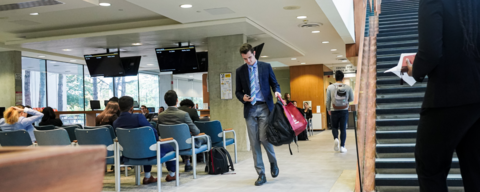
CEE and GSPA partner in piloting new graduate co-op opportunities
Over 65 years ago, the University of Waterloo pioneered co-operative education for undergraduate students in Canada. Today, Waterloo is home to the largest co-op program at a research university. Through an innovative partnership, the University continues to level up on work-integrated learning (WIL) with new and enhanced graduate work-integrated learning (GradWIL) opportunities, providing different paths for graduate students to engage in WIL and develop their career.
Graduate Studies and Postdoctoral Affairs (GSPA), Co-operative and Experiential Education (CEE) and Waterloo’s faculties have partnered to offer GradWIL pilots. Co-op is just one of several models of GradWIL pilots taking place around campus right now. There are currently two types of graduate co-op programs happening on campus — those administered by the academic unit and those supported by CEE. The pilot programs currently supported by CEE include:
- Engineering – Master of Management Science
- Engineering – Master of Electrical and Computing
- Mathematics – Master of Data Science and Artificial Intelligence
“Co-op pilots at the graduate level extend the runway for students to prepare and enhance their work-integrated learning experience,” says Zac Mercer, faculty relations manager, graduate work-integrated learning (GradWIL). “We're adding interventions from day one and we're becoming a part of the student’s journey.”
The goal of the co-op enhancement pilot is to create and test a new graduate support model. Graduate co-op programs often only have one co-op work term compared to four or five that take place in the undergraduate offerings. The new support model for graduate students starts in the term before they begin applying for jobs, or pre-recruitment term, and includes three different forms of intervention for student support through their graduate co-op journey:
- New graduate WIL 601 pre-recruitment term course
- Asynchronous offering to students
- developed with industry partner involvement
- replaces co-op 601 offering
- first pilot is Winter 2024
- One-to-one coaching in the pre-recruitment term
- begins the term before they start applying for co-op jobs and continues throughout their co-op journey
- the same support person throughout
- emphasis on relationship-building and familiarity
- Weekly peer-to-peer support sessions
- Optional, themed, virtual synchronous sessions
- Students who attended the peer-to-peer sessions in the fall saw a 43 per cent increase, on average, in the confidence, comfort or knowledge of the topic discussed
“Early engagement in career support with these students will hopefully lead to improved employment outcomes,” says Mercer. “We want students to set and achieve their co-op goals. Perhaps more importantly than securing ‘the job,’ we want them to feel supported through their WIL experience.”
This feeling is reflected in the feedback received thus far from students. Approximately 83 per cent of students have reported that they are somewhat satisfied or very satisfied with the co-op work term quality of support available to them through their faculty relations manager.
Read more about the student experience on the co-op website.